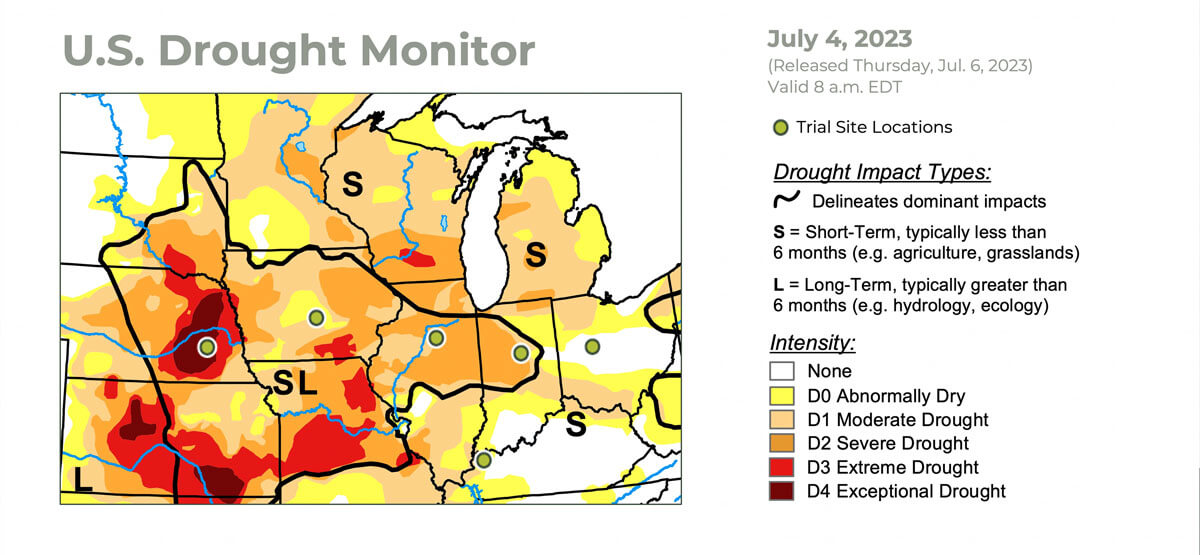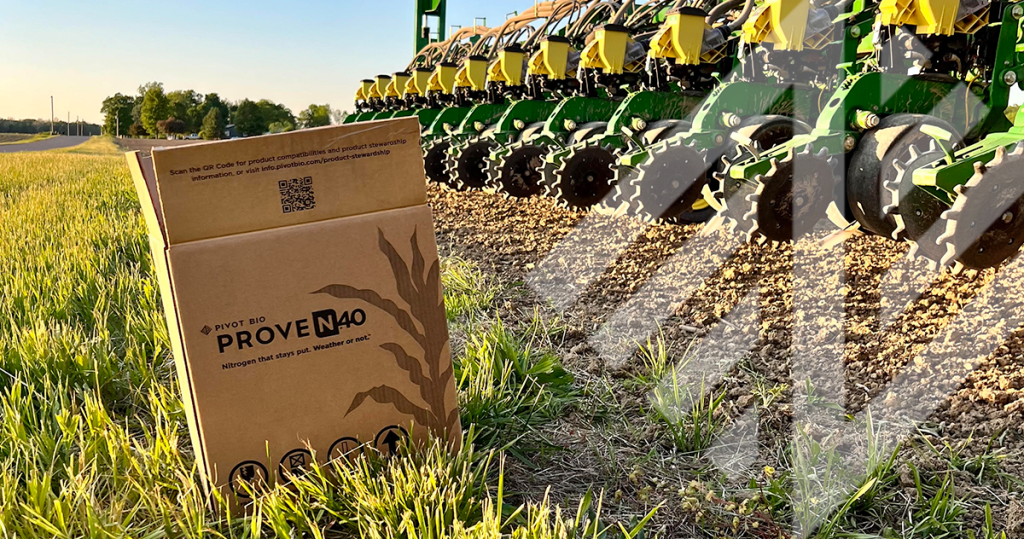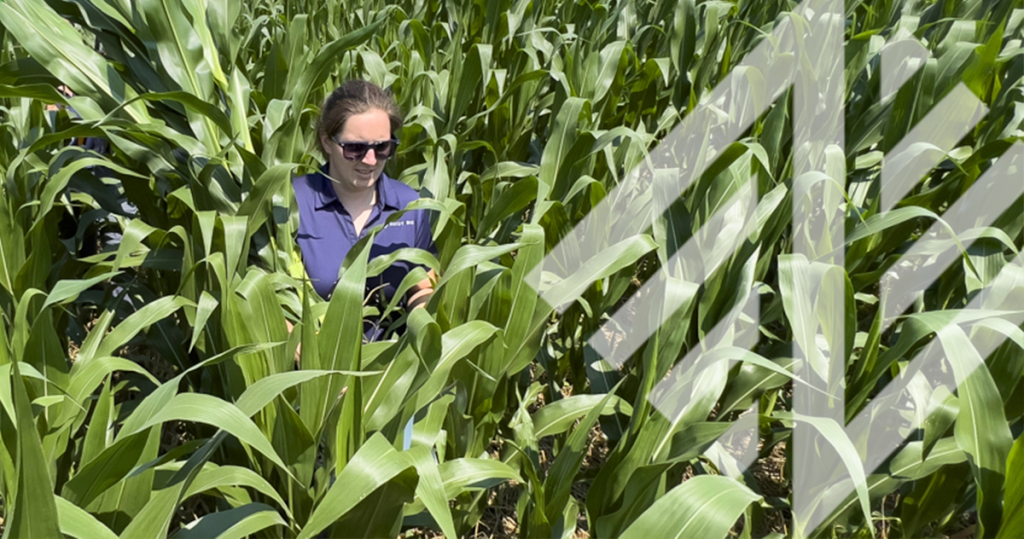Decoding the Data: Our Perspective on Beck’s 2023 PFR Results

Each year, Pivot Bio sets a new standard in nitrogen science with its annual, large-scale research. Conducted both independently and in-house, this research spans thousands of plots, focusing on the rigorous testing of our microbial nitrogen across various soil types and environmental conditions. This research is important to our work, guiding our teams and helping us deliver dependable microbial nitrogen to our farmers.
Our commitment to transparency and helping growers understand this research is part of our support for farmers and integral to our overall mission — to deliver farmers a way to grow the food the world needs reliably and sustainably.
A key component of a successful growing season is an effective and efficient fertilizer management plan. While fertilizer management plans include several essential nutrients, perhaps none are more important to plant health than nitrogen.
Pivot Bio microbes make it possible for nitrogen to be available when and where the corn plant needs it most, at the roots and throughout the growing season. These naturally-occurring microbes live and colonize on the plant’s roots to make nitrogen, which will be taken up by the plant. As the microbes colonize the roots and the root mass increases, there’s more surface area for the microbes to grow. As the roots grow, so does the amount of microbial nitrogen produced.
While Pivot Bio has conducted more than 46,000 plot trials internally, we are also committed to working with multiple universities and other third-party research groups to independently prove the efficacy of our technology.
As farmers plan for the next season, Pivot Bio products can offer a more efficient approach to nitrogen management, ensuring reliable nitrogen delivery when the plant needs it most. For more information on these studies and others, visit Pivot Bio’s collection of independent performance data.
In a year marked by severe drought, Beck’s Hybrids Practical Farm Research evaluated Pivot Bio PROVEN® 40 under unprecedented hot and dry weather conditions. The trials of PROVEN 40 were spread across six states, with the only irrigated site in Nebraska.
Before diving into the study, it’s important to understand the 2023 weather landscape. The U.S. faced an extensive mid-to-late-season drought, as depicted in the map below. When drought strikes later in the season, it impacts corn during the critical reproductive and grain-filling phases of the plant’s life cycle. Severe drought similarly hampers the measurable response of our microbes, as it would all biological organisms.

The Beck’s results demonstrate the impact drought conditions can have on nitrogen uptake. Most sites experienced drought, limiting the corn’s ability to fully utilize added nitrogen. As all farmers know, water availability is critical in yield potential.
The Nebraska site, which received adequate water, reported excellent nitrogen and potassium tissue levels. As previously stated, this trial site was the only site under irrigation, demonstrating the role adequate water plays in nutrient uptake. This site also resulted in a 2% yield advantage for PROVEN 40 at all nitrogen levels.
The study also suggests that plants with PROVEN 40 added earlier in the growing season across multiple trial locations showed a consistent increase in biomass and nitrogen capture.
We also learned through Beck’s research that inconsistencies with plant populations at the Ohio trial site led to unreliable results, highlighting the importance of maintaining consistent stand counts in research plots. Additionally, the plots had quality issues. The imbalance of magnesium to potassium likely hindered potassium uptake, with the high magnesium content competing for absorption.
The study highlights the importance of understanding different nitrogen management practices and how they affect microbial nitrogen uptake. In the Midwest, farmers typically apply a large amount of nitrogen upfront, with smaller side dress applications later in the season. A large side dress in season can minimize the amount of nitrogen that is lost and mask the effects of our microbes. We saw this play out on the Ohio test site, where Beck’s applied 60 pounds upfront and a fairly large side dress application later in the season.
Overall, Beck’s research provided key takeaways that our scientists will use moving forward. In these trials, Pivot Bio PROVEN 40 delivered more nitrogen and resulted in larger plants, but the lack of water in most locations likely limited other nutrient uptake. Additionally, highly efficient nitrogen application practices led to less synthetic loss than would have occurred under typical Midwest farming practices.
Despite the challenges, we learn the most from these types of results; they point to where and how we can refine our microbes and make them more resilient and applicable across various growing conditions. We learned that we can intensify the assessment of microbe performance with a focus on soils rich in clay and magnesium content. And we are already taking steps to develop more versatile microbes, specifically under hot and dry conditions. Additionally, Pivot Bio is actively investigating potential partner products to further enhance the efficacy of our current product line, particularly in drought conditions.
Our team remains committed to revolutionizing agriculture through innovative microbial nitrogen solutions, and we will continue to adapt our products as we manage the complexities of agriculture and extreme swings in weather. The insights gained from Beck’s research highlight the benefits of PROVEN 40 and provide the opportunity for continuous improvement.
With more studies planned in 2024, we will continue to invest in independent research that helps us create even more resilient microbial nitrogen.


